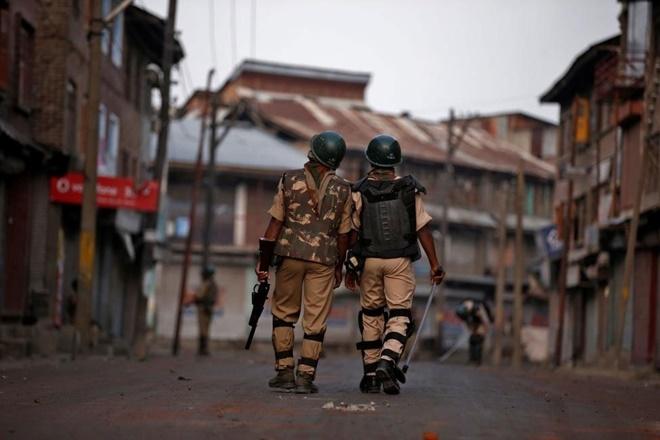UN Disappointed with India’s Dismissal of Kashmir Report

Expressing grave disappointment at the Indian media and administration’s obstinacy regarding the UN report on Kashmir published a month back, Rupert Colville backed the claims on Kashmir by UN Office of the High Commissioner for Human Rights (OHCHR).
In a press briefing on July 17, Colville, the spokesperson of the UN body, said that the focus of the report was on the "situation of human rights in the Indian state of Jammu and Kashmir from July 2016 to April 2018 ...excessive use of force by Indian security forces that led to numerous civilian casualties.”
Since the publishing of the report, several leading Indian media houses have accused the High Commissioner of being biased and willfully targeting the Indian state. The most common allegation against the report was that it uses "unverified information" to malign the Indian image. Colville, in his speech, "set the facts straight" by pointing to the 388 detailed footnotes marked in the report mentioning each source - most of which are official sources such as the Indian Parliament, Ministry of External Affairs, the Union Ministry of Defence, the Jammu and Kashmir Human Rights Commission, and many civil society organisations like the Jammu Kashmir Coalition of Civil Society.
"Pakistan-authored report" and a "nefarious conspiracy" are two of the several colourful phrases that have been used by the State to describe and shun the report. Raveesh Kumar, the Ministry of External Affairs official spokesperson has called the report "... fallacious, tendentious and motivated..." Kumar has further described the report as a “selective compilation of largely verified information”, “overtly prejudiced” which “seeks to build a false narrative”.These allegations are unsettling, as the High Commissioner had met with representatives of Pakistan and India in July 2016. He wished to gain unconditional access into both regions on either side of the LOC. Both governments denied this access and hence, the OHCHR undertook remote monitoring of the regions.
Also Read: UN Report Flags Excessive Use of Force by the Indian Government in Kashmir
Another accusation deemed baseless by the UN OHCHR was that a Canada-based imam, who goes by the name of Zafar Bangash, was in constant contact with High Commissioner Zeid Ra'ad Al Hussein, thus influencing the contents of the report. Accepting the possibility of having received mails or letter from Bangash, he made clear that the OHCHR receives many such emails and letters every day and politely acknowledges them all. He called the allegation "totally untrue", and denied any possibility of using any information that might have been provided by the imam. Many media outlets even alleged ISI’s involvement in the report, pointing to a picture of Hussein with three individuals from Pakistan-administered Kashmir. Colville claimed that all accusations were “... designed to discredit the report while avoiding real examination of, and reflection on, its contents.”
The UN report was the first consequential report by the international statutory organisation on Kashmir. Refusing to align itself to the mainstream understanding that calls the Kashmir issue a 'law and order concern,' it clearly drafted14 specific problems, underlining the key issues resulting in the human rights' crisis.
The report hit hard on Armed Forces Special Powers Act, 1990 (AFSPA) - pointing to Section 7 and Section 4 under the Act - and the Jammu and Kashmir Public Safety Act, 1978 (JKPSA). JKPSA allows for the preventive detention of people against whom there may be no accusation of criminal offense. “The PSA institutionalizes the state of emergency. Its modus operandicreates a complete, self-enclosed and socialised carceral system – a system of no exit”, legal researcher-activist Shrimoyee Nandini Ghosh said, speaking with The Wire.
The report further highlighted the increasing cases of civilian killings - particularly in 2018 - in the Kashmir valley. Adding to the dangerousness of such excessive force, it strongly condemned the use of pellet-firing shotguns as a tool to curb resistance and called it “one of the most dangerous weapons used against protesters.”
Citing the example of Shabir Ahmad Mangoo, who died due to torture while in detention in August 2016, the report questioned the inaction of the state and Centre in investigating the security personnel responsible even after the police had registered an FIR against the men.
Some other key reasons leading to the human rights situation, according to the report were enforced disappearances, restrictions of freedom of expression, reprisals against human rights defenders attempting to attract international attention to the human rights situation and restrictions of journalists, and the countless sexual violence reports against security forces and armed forces.
At this point, the history of India's role with the Human Rights Council demands mention. India is one of the 47 countries that are part of the Council and has, at many instances, supported UN intervention in nations where citizens have faced a direct assault on their basic human rights.
The Council was installed in 2006, replacing the Human Rights Commission. Member nations in the Commission believed that a few of them wielded unchecked power, protected themselves and their allies from review and intervention. India had strongly sided with the decision to dissolve the Commission, thus becoming a part of a Council by promising to make the human rights situation better for all its people and approach situations constructively. The member Nations are picked on a term basis with each member given a three-year term. India has been a member twice till 2017. India has also been a part of the Troika of countries that are picked to assess and review UN members’ human rights record every four-five years. Hence, it is puzzling when our Defense Minister claims, "it was a report which was prepared sitting somewhere else. The assessment is totally without basis," referring to the Kashmir report that concerns our Nation.
What’s most striking in the UN report on Kashmir are the 17 recommendations it provides to the government of India. “Fully respect the right of self-determination of the people of Kashmir as protected under international law”, reads the last recommendation, almost seeming as a conclusive statement by the OHCHR.
A few others that need emphasis are; the urgent annulment of AFSPA and in the meantime, revocation of the requirement for government sanction to prosecute a security personnel; amendment of JKPSA to ensure its compliance with the international human rights law; provision of reparations to all sexual abuse victims of state and non-state actors, and rehabilitation to families whose members have been killed in security operations; treatment of all persons below the age of 18 in consistency with the UN Convention on the Rights of the Child; end in restriction of movement of journalists and arbitrary bans on the publication of newspapers in J&K.
Colville, concluding the press brief, expressed that the report should not be disregarded for political motives and the issue, not diverted from what it is - violation of human rights of millions of people in Kashmir. “Ultimately, our goal in drafting this report was to assist the States and others to identify and address human rights challenges and to give a voice to all Kashmiris who have been rendered voiceless amid the deep political polarization” he added.
India’s image has recently faced much corrosion due to the rising cases of mob lynching, rapes and overall atrocities on minority groups. Has the Indian state, with full support from the mainstream media, lost its chance at recovering from this bad reputation by disregarding and dismissing the ugly truth of its failure to govern Kashmir? The OHCHR in its report provided intricate sourcing, and details on the methodology it was compelled to use in the face of denial of access by India and Pakistan. The Indian state has not, in its downright dismissal of the report, provided one constructive rationale.
Get the latest reports & analysis with people's perspective on Protests, movements & deep analytical videos, discussions of the current affairs in your Telegram app. Subscribe to NewsClick's Telegram channel & get Real-Time updates on stories, as they get published on our website.
























